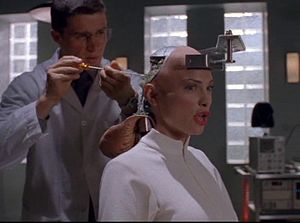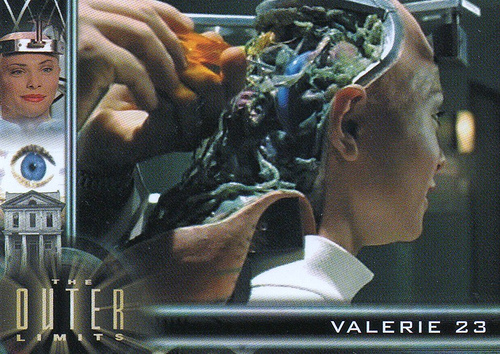The Outer Limits - Sex and Science Fiction

Valerie 23
I made a recent purchase of a used copy of this disc's assembly of episodes -- specifically to re-visit the Valerie 23 production at my leisure -- which I have done and still not gone on to look at the other material.
This 1995 attempt to resurrect the original B&W "Outer Limits" lacked something as an anthology of science fiction tales put to film/video. Worse attempts in later years would follow. The grouping of stories based on a general subject matter is unorthodox and of no particular benefit for purveyors of the TV show's eclectic mix of science fiction yarns.
Few of the screenplays were memorable; however, Valerie 23 impressed me. My recent re-examination of the episode held up well. Something of a twist on "I Robot," its uniqueness is due to a concentrated focus upon robot and human sexual intimacy.
What lifts this one episode is the explicit pluses and minuses of technology advancing to a point where the lines between "what is human" becomes blurred -- not exactly unique in opening that can of worms, but with its focus on intimacy between Valerie 23 (a robot played by a ravenously gorgeous actress who provides an uncanny depiction of a purposely manufactured companion), the story excels in its examination of what defines something as being "human" -- in some ways not unlike HAL 9000 from "2001: A Space Odyssey." Where HAL's human aspects were confined to sophisticated artificial intelligence and a gentle, controlled voice, Valerie 23 offers herself as a do-anything-for-pleasure unit and is physically indistinguishable from a biological entity.
The nerdy, prudish, wheel-chair-bound employee targeted for test sampling the product treats Valerie as a machine, which initially leaves the "girl" in tears. The story suggests that only something that can fear its own demise can claim the hallowed ground of being human. (Valerie 23 does in fact fear her own demise.) A more realistic measure of this precarious balance would be just how much emotion others might invest in the artificial person. For the sake of television viewing, Valerie 23 develops a murderous jealousy over her human companion, despite his off-putting treatment of "her."
In science fiction lore, there is nothing new in this equation except the degree to which an android/robot/cyborg might establish human-like emotions on a very personal level. We saw something like this later, in Steven Spielberg's "A.I. - Artificial Intelligence." Many years earlier we saw a precursor to the story in a "Twilight Zone" episode where a lonely prisoner on a prison planet is given a robot for companionship.
With the swift advances in microelectronics and synthetic materials, it is not unlikely that we will see the seeding of Valerie 23-like pleasure models that can be bought at a hefty price. Perhaps we will see realistic holograms come first, but inevitably, a Valerie 23 model is bound to be produced. A Valerie 23 could be the ultimate Stepford Wife, without the mental reassignment. So far, science fiction, television and film, have only demonstrated the potential bonding between a real man and an artificial woman; however, there is nothing to limit real women from bonding to artificial men. What's good for the goose, is good for the gander. If men are going to opt out of real-world relationships, it doesn't seem presumptuous that women would do the same.
All of this is fantastic material for speculative fiction -- as the technology is almost at our fingertips, and with the difficulty incumbent upon most man-woman relationships, a feasible alternative is not at all out of the realm of possibility.
Children start out projecting a great deal of emotion upon their teddy bear. As far as I can see, why would this projection of emotion stop at childhood if it didn't have to? If you insert the possible money bonanza that the invention of these artificial beings might mean, unless our society undergoes some kind of radical catharsis, we may be seeing legal arguments being made for a statuary recognition by the courts of man-to-machine bondings with all the rights and privileges entailed therewith. Such considerations seem mind-bending, perhaps ridiculous, but I can envision emotional attachments between man and machine becoming extremely powerful despite whatever moral grounds the opposition may bring forth.
If given the opportunity, man will create what he desires, and perhaps all of this is just fine. Does its likelihood preclude the end of our species via some drastic reduction of normal reproductive methods. Not likely. There will always be a monetary issue attached toward the purchase of an artificial being. Others will find the idea outlandish and even sacrilegious. So, the market may not be huge, but it will certainly be large enough to sustain an industry. At the very least the disagreement will create a fervour far more propelled and rejected than the matrimony between people of the same sex.











